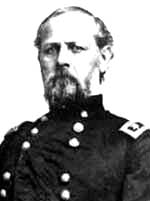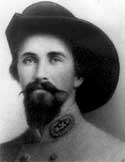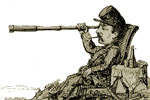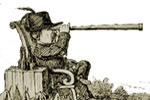
General Buell |
|
While Gen. Buell had his headquarters at Nashville, and when his army was on its way north after General Bragg, I was called upon to do special duty as a bearer of dispatches for Gen. Buell. I had a good deal of experience with government ciphers, and was quite familiar with the
number 2 cipher which was then in use.
I think it was in August, it was at any rate, before Gen. Buell's army left Nashville on its way north. I reported at headquarters in my uniform and learned that the general desired me to start north that night with some very important cipher dispatches. The general said I would
have to go alone and quietly informed me that he had positive information that Morgan [Brig. Gen. John Hunt Morgan] had been at Gallatin [Tenn.] that day. It would not be well to have been in uniform on such a trip, so I put on citizen's clothes.
It was a starlight night, no moon to light me on my lonely ride. The pike ran for many miles through deep woods, mostly beech whose branches grew low to the ground casting heavy shadows, making it dark indeed. The stumps and logs in the woods seemed always to assume the forms of
guerrillas to my excited imagination, and the least noise or movement would startle my horse and cause her to shy, and I have always thought she fully appreciated the dangers of the situation.
After about 25 miles of this kind of riding, alone, on a hard pike, I was brought to the town of Gallatin, just at early sunrise. There I found the railroad track torn up. The railroad ties, on which had been piled the rails, had been set on fire and were still burning.
On the other side of town, after I had gone through, I met an old darky. I asked him if i was on the Franklin Pike, and he said I ought not to have through the town of Gallatin at all, that the Franklin Pike bore off to the left just at the other edge of town. I did not relish the
idea of another trip through Gallatin, and asked if he knew of any other way to get to Franklin without going back through Gallatin.
He scratched his head for a moment and then told me that if I would keep straight ahead for about a mile, I would come to the dry bed of a creek, and if I would turn to my left and go up that creek for a short distance it would bring me to a gate across the creek.
This gate would let me into a man's back yard. He told me also that the man who owned that yard was a rebel, but if I could get through his yard I would find the Franklin Pike right in front of his house.
I found the creek and the gate into the yard. As I passed through the gate, I saw saw on the porch, two gentlemen who looked at me very suspiciously. I merely said "good morning" to them and asked if that was the Franklin Pike in front of the house. They said it was and,
much to my surprise, allowed me to pass through unquestioned.
Some time after this as I was riding along, a man came up behind me. He remarked that my horse seemed very tired and asked if I was from the south. I told him I was from Nashville and was going to Franklin. We chatted on quite pleasantly for a short distance until we came to a
farmhouse which stood back some little way from the road. At the gate I noticed there was a horse standing with a saddle on it. At the house, near the road, there was a gentleman who immediately recognized my lately found traveling companion. These two men became engaged in conversation and I, not
knowing either of them, jogged along on my horse, leaving them behind and thinking no more about them. I had not gone more than two miles when these same two men came galloping up behind me and overtook me.
We rode this way, engaged in conversation, until we came to the town of Mitchellville which is on the state line between Kentucky and Tennessee. As we came up to the blacksmith's shopwe saw there hitched around 25 or 30 of as fine horses anyone would wish to see. And leaning up against
the fence was about the same number of men who looked well enough, but seemed to be an object of suspicion. I merely passed the compliments of the day with them and was about to proceed when I was stopped and politely requested to dismount. I objected, but it was not the slightest use.
My chief anxiety was on account of my dispatches, for I knew is was of the highest importance that they should be delivered in safety at Franklin. After I had dismounted they took me into the house and searched me thoroughly, but fortunately for me they did not find anything. What
little money I had they confiscated. They kept me for some hours, and during all this I had nothing to eat, not even a drink, and could not even get a drink for my horse. They, after some time, let me out of the house, and out of doors I was subjected to another rigid examination.

John Hunt Morgan |
|
After the second examination, one of the men called me off to one side and told me he was a Union man and had always been, all the other men except him were Morgan's men. He then magnanimously informed me that he had taken fancy to me and was anxious to assist me, and in the most
confidential wisper imaginable he assured me that if I would tell him who I was, where I wqas going and what I was going for, that he could form a plan of action.
I laughed, and asked him in a loud voice so that the rest could hear it if he had taken me for a natural born damned fool. I immediately turned and told them, I was simply a citizen passing along the highway, and I did not consider that any set of un-uniformed men had a right to
stop a citizen under such circumstances.
I told them that, if they must know who I was, I would tell them. I told them I was born and raised in Louisville, Kentucky, that I had been in Huntsville, Alabama, but that I had heard that my sister, in Louisville, was laying at the point of death, and I came to Nashville too late
to take the regular conveyance and so had started on horseback at midnight from Nashville in order to catch the train Franklin that day.
The story was improbable, but I stuck to it tenaciously all the whole time and did not deviate from it. The bluff had the desired effect and, to my exceeding great relief, the man did not press the question. After a parley among themselves they concluded to let me go.
I jumped into the saddle, and just as I was settling myself for the start, one of the men said to another, "hand me my stick." The man gave him what appeared to be a common walking stick. He took it, and without hesitation or a word, he struck my horse across the forelegs, just below
the kneecaps. The horse fell as if she had been shot, and I had barely time to throw myself out of the stirrups to prevent her falling on me. The man laughed, and one of the gang said he guessed my horse must have a burr under saddle. It then flashed across me that this man had ruined my horse,
of which I thought a great deal.
I was overcome with anger at the treatment my horse had received. I leaned against the fence and cursed those fellows to everything I could think of. One pulled out his pistol, presented it to my head, and told me I had said enough. He said he believed I was a Yankee, a Yankee spy,
and if he had his way about it he would blow the whole top of my head off. This brought me to my senses and I said no more.
They gave me permission the second time to go, and I started off on foot, leaving my horse. The men called me back and told me I must take her. I tried to make her get up, but found she could not. One of the men suggested that I should pull her forefeet out from under her. This I did.
I looked at them and found a little cut about a quarter inch long right in the kneecap, a cut an each leg. it seemed to have injured the cords at the back of the legs were perfectly sound. she could rise herself by them. I got her on her feet and thought there was nothing serious the matter and that she
might carry me. But she fell to the ground as soon as I got in the saddle. they insisted that I must take her with me, so I started off to Franklin on foot leading this horse. The distance was seven miles and it was 3 o'clock in the afternoon.

Gen. Rousseau |
|
I lead the horse all the way to Franklin, arriving sometime before dark. If I had had anything to kill that poor animal with I should have done so, and put her out of her suffering. At Franklin I was rejoiced to find the telegraph wires were working, and I sent my messages off, and gave my
horse to the agent at Franklin.
I remained at Franklin a few days and started back alone in one of the city hacks which had brought a load of people up from Nashville early in the morning. I went back through that same town of Mitchellville. A short distance out of the town I met General Rousseau and his staff. He was
at the head of his division on his way north. I offered the general a copy of the "Enquirer", which he received gladly. And all along that most tedious ride of almost 20 miles, the army going one way and I the other, I distributed those "Enquirers", having when I arrived at Nashville only five or six left.
Those were sold out at auction, some going as high as five dollars each.
I reported back to General Buell the night of my arrival at Nashville and had the satisfaction of being warmly commended on my success.




